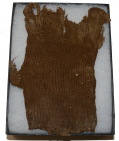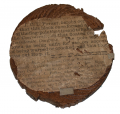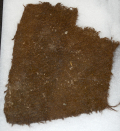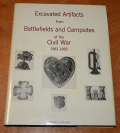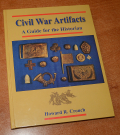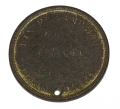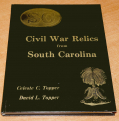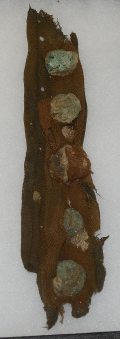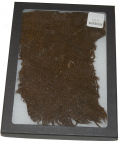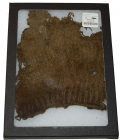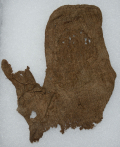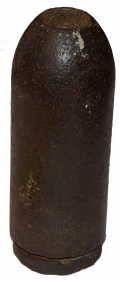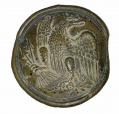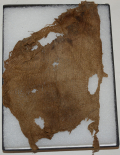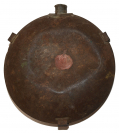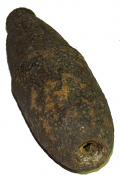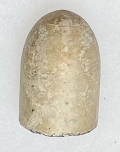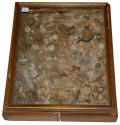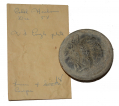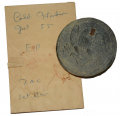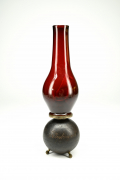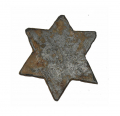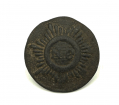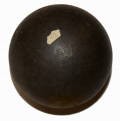site search
online catalog
Relics
Showing 51 to 100 out of 353
REMNANT OF SCARCE INDIAN WAR SOLDIER’S MITTEN FROM FORT PEMBINA, ND
This comes from the excavations at Fort Pembina, occupied 1870-1895, where cold weather in winter months might well be a concern. The army began issuing mittens in 1873. Before that men were left to… (1052-584). Learn More »
SLICE OF CONFEDERATE FLAG POLE FROM RICHMOND
Here is a 3/8” thick slice of wood that measures 4 ¼” in diameter. Glued to one side is the remains of an old, printed label: “Richmond, Va., May 20, 1890. I, C.L. Parker, hereby cer[tify] that… (1030-324). Learn More »
$625.00
Originally $780.00
KEPI CHINSTRAP AND SIDE BUTTONS FROM AN INDIAN WAR FRONTIER
This is a complete leather chinstrap from an army kepi or forage cap from excavations at Fort Pembina, ND. The chinstrap is a two-piece style with a fixed loop on the end of one strap and a fixed… (1052-486). Learn More »
CIVIL WAR-INDIAN WAR UNIFORM COAT PIECE WITH BUTTON FROM FORT PEMBINA
This is part of the right lapel of a US army coat discarded by a soldier at Fort Pembina, ND, sometime between 1870 and 1895, and is from excavations in wet, anaerobic soil that has preserved leather… (1052-724). Learn More »
PIECE OF US ARMY BLANKET FROM FORT PEMBINA, NORTH DAKOTA
This piece of a US Army military issue blanket comes from excavations at Fort Pembina, ND, conducted on private property with the owner’s permission, a fort established in 1870 by troops of the 20th… (1052-616). Learn More »
APPOMATTOX STATION RELIC GROUPING – LAST CAVALRY FIGHT OF THE EASTERN THEATER
On the day preceding the surrender at Appomattox, the last cavalry engagement of the Eastern Theater took place at Appomattox Station. Identifying an opportunity to neutralize and capture an entire… (173-4339). Learn More »
$125.00
ON HOLD
“EXCAVATED ARTIFACTS” BY STANLEY PHILLIPS
Full title of this hardcover volume is “EXCAVATED ARTIFACTS FROM BATTLEFIELDS AND CAMPSITES OF THE CIVIL WAR 1861-1865” by Stanley S. Phillips. Volume measures 8.5” x 11” and runs 220 pages… (1266-1053). Learn More »
EXCAVATED MODEL 1855 SOCKET BAYONET MADE INTO POT HOOK
This is a M-1855 socket bayonet in very good, “dug” condition. Bayonet has been cleaned and coated and the iron is in very stable condition. The tip has been broken off and the next 2 ½”… (1000-1380). Learn More »
$360.00
Originally $450.00
RARE CONFEDERATE “THREE SQUARE” SOCKET BAYONET MADE INTO POT HOOK
This is an excavated example of a Confederate-made musket socket bayonet. Measuring approximately 21” overall with a 2 ¾” socket. This was made for an early .69 caliber musket with a bayonet… (1000-1374). Learn More »
$715.00
Originally $895.00
BOOK – CIVIL WAR ARTIFACTS, A GUIDE FOR THE HISTORIAN BY CROUCH
A classic “relic book” by Howard R. Crouch. Printed hardcover, 8.5” x 11”, 238 pages. Very good condition from the library of William Turner. The pages are filled with photographs of great… (1266-1086). Learn More »
RARE CONFEDERATE “THREE SQUARE” SOCKET BAYONET FROM DREWRY’S BLUFF
This is an excavated example of a Confederate-made musket socket bayonet. Measuring 21” overall with a 2 5/8” socket. This was made for an early .69 caliber musket with a bayonet lug mounted… (1000-1372). Learn More »
$635.00
Originally $795.00
EXCAVATED CIVIL WAR “VMM” OVAL WAIST BELT PLATE
Presented here is an excavated “Volunteer Militia of Maine” oval waist belt plate that was issued to the State’s volunteer infantrymen early in the Civil War. Maine formally organized its… (1000-1541). Learn More »
$1,480.00
Originally $1,850.00
RELIC GROUPING – CONFEDERATE SURRENDER AT APPOMATTOX
At Appomattox, once news of the surrender circulated, Confederates dismantled and destroyed as much equipment as possible to prevent confiscation by US Forces. Dug from the last documented camp site… (173-4319). Learn More »
DUG CIVIL WAR ID DISK FOR 12TH PENNSYLVANIA RESERVES (41st PENNSYLVANIA) SOLDIER
Front of the tag has a bust of General McClellan surrounded by “MAJOR GENERAL GEO. B. MCCLELLAN / WAR OF 1861.” Face is dark with gilt remaining in the low areas. Reverse is stamped “DANIEL… (1000-1836). Learn More »
$1,800.00
Originally $2,250.00
BOOK – CIVIL WAR RELICS FROM SOUTH CAROLINA
Limited Edition, Numbered and Signed. Hardcover by Celeste and David Topper. Black covers with title on front cover and spine, 8.5” x 11”, 201 pages, inscribed to William Turner. Number 123 of… (1266-1058). Learn More »
GEORGIA CARTRIDGE BOX PLATE FROM SPOTTSYLVANIA COUNTY WITH CARVED DESIGNS ON THE REVERSE
A scarce Georgia state seal cartridge box plate with a pleasing patina found November 25, 1975, in Spotsylvania County. These followed the US 1839 pattern that was both ornamental and served to keep… (1262-03). Learn More »
$4,750.00
ON HOLD
PIECE OF AN INDIAN WAR M1872 FATIGUE BLOUSE OR DRESS COAT FROM FORT PEMBINA, ND
This is a piece from the lapel of a US Army jacket showing part of the blue outer fabric, the lining and the remains of five corroded brass buttons. From the size and spacing of the buttons this is… (1052-608). Learn More »
PIECE OF CIVIL WAR ARMY BLANKET FROM FORT PEMBINA, NORTH DAKOTA
The army had vast stocks of Civil War material left over at the end of the war. These supplies, along with the reduction of the postwar army meant U.S. troops were getting Civil War gear well into the… (1052-617). Learn More »
SCARCE INDIAN WAR SOLDIER’S MITTEN FROM FORT PEMBINA, ND
This comes from the excavations at Fort Pembina, occupied 1870-1895, where cold weather in winter months might well be a concern. The army began issuing mittens in 1873. Before that men were left to… (1052-620). Learn More »
INDIAN WAR SOLDIER’S MITTEN FROM FORT PEMBINA, ND
This comes from the excavations at Fort Pembina, occupied 1870-1895, where cold weather in winter months might well be a concern. The army began issuing mittens in 1873. Before that men were left to… (1052-619). Learn More »
FLY FROM INDIAN WAR SOLDIER’S TROUSERS, FORT PEMBINA, ND
This comes from the excavations at Fort Pembina, occupied 1870-1895, where the wet, anaerobic soil conditions of the dig (conducted on private property with the owner’s permission,) have yielded… (1052-599). Learn More »
$65.00
ON HOLD
RARE EXPERIMENTAL 10-POUNDER PARROTT SHELL
While the Parrott elongated shell was the standard ammunition for the 3-inch rifled cannons during the Civil War. This specimen is believed to be a very rare early or experimental variation. This… (490-7004). Learn More »
SPRINGFIELD 1838 DATED M1816 PERCUSSION CONVERSION MUSKET FROM THE YORK SPRINGS, PA., G.A.R. POST, WITH MILITARY RACK MARKINGS
A good example of a classic early Civil War musket: a Model 1816 converted from flintlock to percussion in the early 1850s to bring it up to par with the new, percussion M1842 muskets. These are .69… (1202-429). Learn More »
CARVED CARTRIDGE BOX BELT PLATE OF WILLIAM CHURCH, CO. K 13th VERMONT, KILLED IN ACTION AT GETTYSBURG IN THE REPULSE OF PICKETT’S CHARGE, WITH BATTLE DAMAGE
“After the battle was won, and the victory was ours, and we were returning to a position in the front line, a hostile shell hit him and burst causing almost instant death. Among all the bodies… (2025-41). Learn More »
$4,250.00
ON HOLD
CIVIL WAR-INDIAN WAR UNIFORM LAPEL FROM FORT PEMBINA
This strip of cloth showing three buttonholes (and what seems to be part of a fourth) is the remnant of an army dress coat discarded after its useful days were done at Fort Pembina, a small frontier… (1052-610). Learn More »
INDIAN WAR SOLDIER’S MITTEN PIECE FROM FORT PEMBINA, ND
This comes from the excavations at Fort Pembina, occupied 1870-1895, where cold weather in winter months might well be a concern. The army began issuing mittens in 1873. Before that men were left to… (1052-621). Learn More »
CIVIL WAR-INDIAN WAR FORAGE CAP VISOR
This is a well preserved leather visor from a forage cap recovered at Fort Pembina, ND, where it was preserved in remarkable condition by wet, anaerobic soil conditions. This is typical of the simple… (1052-485). Learn More »
CIVIL WAR-INDIAN WAR FORAGE CAP VISOR
This is a well preserved leather visor from a forage cap recovered at Fort Pembina, ND, where it was preserved in remarkable condition by wet, anaerobic soil conditions. This is typical of the simple… (1052-482). Learn More »
CIVIL WAR-INDIAN WAR FORAGE CAP VISOR
This is a well preserved leather visor from a forage cap recovered at Fort Pembina, ND, where it was preserved in remarkable condition by wet, anaerobic soil conditions. This is typical of the simple… (1052-481). Learn More »
$45.00
ON HOLD
RELIC US CIVIL WAR CANTEEN: FROM YORK SPRINGS, PA, GAR POST #9
This regulation, smooth-sided canteen came from the York Springs G.A.R. post, is pretty clearly an early battlefield pick-up, and may well have a Gettysburg origin. It is untagged, however, with the… (2023-2674). Learn More »
U.S. 3” SCHENKL PERCUSSION SHELL – EAST CAVALRY FIELD, GETTYSBURG - GEISELMAN COLLECTION
This Federal, intact 3” Schenkl percussion shell specimen is a wonderful artillery relic recovered from East Cavalry Field sometime after the Battle of Gettysburg. The percussion shell measures 9”… (2024-2389). Learn More »
ENGLISH .69 CALIBER "TOWER" BULLET
This English pattern of bullet have no grooves because they were to loaded with the lubricated cartridge wrapper. This bullet has a deep plug cavity, was machine pressed, and has a very thick skirt.… (2024-251). Learn More »
U.S. 3” SCHENKL PERCUSSION SHELL FRAGMENT RECOVERED AT HUNTERSTOWN NEAR GETTYSBURG - GEISELMAN COLLECTION
Here is a large, very fine example of shell fragment from a fired, 3” Schenkl percussion projectile that was recovered from the battle of Hunterstown near Gettysburg. Once part of the Detrick… (1179-1293). Learn More »
VERY RARE CONFEDERATE “ROPE BORDER” BELT PLATE
Dug condition stamped brass oval “rope border” belt plate. Unlike their US counterparts, these were not lead filled. These are not commonly found and can most often be traced back to the… (1202-260). Learn More »
$3,100.00
ON HOLD
RELIC -- US NAVAL WATERCAP FUSE WITH BUSHING, DATED 1864
Excavated naval watercap fuse dated 1864 and in good condition. This fuse is made of brass with flange on top, with threaded portion and tapered body. A brass bushing is on this fuse to fit into… (2024-2327). Learn More »
EXCAVATED CONFEDERATE CAVALRY SABER
If they gave out awards for crudely made cavalry sabers, this one would be in the running. The guard is simple flat iron, curving in a broad semicircle, with a simple hole in one end through which the… (490-6746). Learn More »
LARGE FRAMED RELIC SHOWBOARD
This relic board is very like those assembled from Gettysburg relics by John Rosensteel and displayed on the porch of the Round Top Museum, but differs in displaying the relics on horizontal rather… (1242-06). Learn More »
$3,200.00
Originally $3,500.00
ROUND EAGLE CARTRIDGE BOX SHOULDER BELT PLATE FROM 18th CORPS LINES, COLD HARBOR, EX-KERKSIS
This regulation belt plate for the cartridge box sling was in the collection of Syd Kerksis, well-known and respected early collector and author. It comes with his annotated envelope indicating he… (766-2044). Learn More »
$395.00
ON HOLD
ROUND EAGLE CARTRIDGE BOX SHOULDER BELT PLATE FROM 1st DIVISION 2nd CORPS LINES, COLD HARBOR, EX-KERKSIS
This regulation belt plate for the cartridge box sling was in the collection of Syd Kerksis, well-known and respected early collector and author. It comes with his annotated envelope indicating he… (766-2048). Learn More »
$395.00
SOLD
WOODWARD GETTYSBURG LAMP USING A CONFEDERATE 12-POUND SIDE-LOADING SPHERICAL CASE SHOT
Local gunsmith Edward Woodward turned his talents to the relic business not long after the battle, selling relics picked up here to veterans and visitors as early as 1865, and is particularly known… (490-6965). Learn More »
EXCAVATED U.S. 3” PARROTT SHELL FROM GETTYSBURG GAR POST #9
Here is a Gettysburg excavated Civil War Federal 3” field artillery projectile often referred to as a Parrott Type III shell excavated from an unknown location area on the Gettysburg battlefield… (2024-2135). Learn More »
$1,295.00
ON HOLD
SPEARHEAD FROM A BROKEN LANCE
This is the spearhead section only from a broken lance. The piece meas. approx. 38.50 inches long overall. The iron point of the spearhead itself is double edged with a raised ridge on each side… (490-3235). Learn More »
RELIC US PATTERN 1839 BELT PLATE
This Federal belt plate is of the regulation 1839 pattern. Constructed in the die-struck and rolled brass method, the brass accoutrement’s face shows a very clear “US”. Face has an even brown… (1256-102). Learn More »
RELIC, HAND-MADE UNION 8TH ARMY CORPS BADGE
Six-pointed star carved from a flat piece of white metal, likely pewter. In fine, “dug” condition with light oxidation on points and edges. Measures approximately 1.25” across points. Unknown… (490-6757). Learn More »
TWO PIECE GETTYSBURG SOUVENIR BATTLEFIELD WOOD CANE
Two piece Gettysburg souvenir battlefield wood cane. The top knob is stamped “Wheatfield Gettysburg”. Just below this marking the darker wood shaft is stamped “Devil’s Den”. The cane… (635-594). Learn More »
EXCAVATED CIVIL WAR US MODEL 1840 MUSICIAN’S SWORD
This pattern of sword for wear by musicians was part of the 1840 series of arms that included new patterns of cavalry saber, officer’s sword, non-commissioned officer’s sword, etc. This is similar… (490-6745). Learn More »
RAIL SECTION FROM THE MANASSAS GAP BRANCH, ORANGE & ALEXANDRIA RAILROAD
This is a nicely labeled section of rail stamped in small letters: “Section of U. rail used on the Manassas Gap branch Orange & Alexandria R.R. during the war 1861-65” and signed on the top… (1202-186). Learn More »
NORTH CAROLINA SUNBURST COAT BUTTON
Button features "NC" surrounded by a sunburst, made for North Carolina troops. One-piece stamped brass coat button. Measures 22mm. No back mark. Shank missing. This pattern features seven rays. "NC"… (2024-700). Learn More »
CONFEDERATE 3” MULLANE COMMON SHELL
Here is a fired Confederate 3” bourreleted Mullane Type 1 common shell recovered from an unknown battlefield location. Made for the 3” Ordnance Rifle. Also known as a “Tennessee Sabot”, this… (490-7005). Learn More »
U.S. / C.S. 12-POUNDER SOLID SHOT – FROM G.A.R. “SKELLY” POST #9, GETTYSBURG
This is the most common solid shot projectile of any caliber used during the Civil War by both the Federal and Confederate forces. This is a solid iron cannon ball with dark brown tone and smooth… (490-6993). Learn More »
Showing 51 to 100 out of 353
Most Popular
Historical Firearms Stolen From The National Civil War Museum In Harrisburg, Pa »
Theft From Gravesite Of Gen. John Reynolds »
Selection Of Unframed Prints By Don Troiani »
Fine Condition Brass Infantry Bugle Insignia »
British Imported, Confederate Used Bayonet »
Scarce New Model 1865 Sharps Still In Percussion Near Factory New »
featured item
CONFEDERATE GENERAL THOMAS “STONEWALL” JACKSON’S SIGNED, PERSONAL COPY OF A COMPLETE TREATISE ON FIELD FORTIFICATIONS
Thomas "Stonewall" Jackson Signed Copy of His West Point Textbook, A Complete Treatise on Field Fortifications. The future Confederate general's bold signature, signed "Thos. J. Jackson" ca. 1846, occurs at the top of the front free endpaper. The… (1179-682). Learn More »



